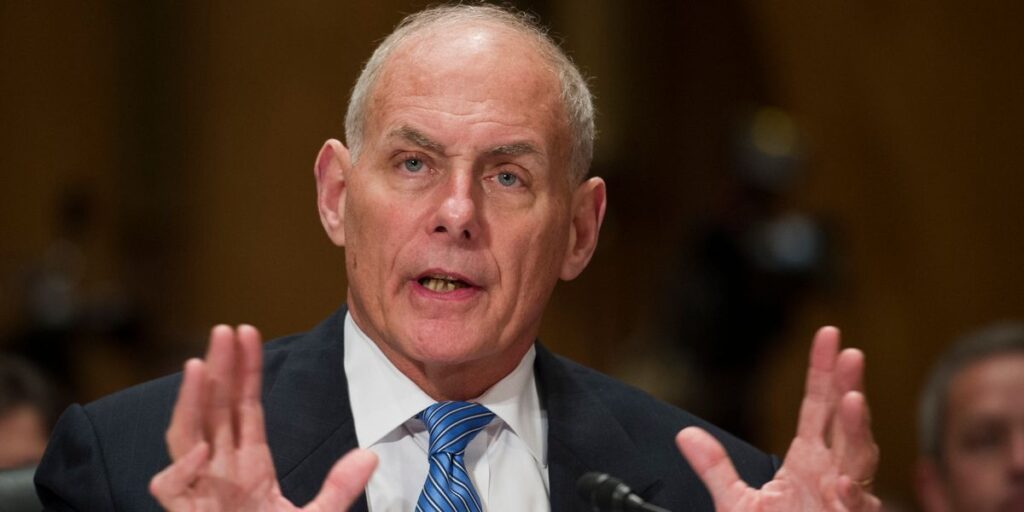In a series of alarming revelations, John Kelly, former chief of staff to Donald Trump, voiced serious concerns regarding the implications of Trump’s potential return to the White House. Kelly described Trump as a figure who embodies characteristics of fascism, highlighting his claim that the former president never truly accepted his loss of absolute power and often expressed desires to operate with a dictatorial mindset. Kelly’s insights stem from their extensive time spent together in the Oval Office, where he observed Trump’s tendencies toward authoritarianism and militarism. Kelly articulated that these inclinations pose a significant risk to American democracy, marking Trump’s perspective on governance as reflective of a centralized autocracy marked by suppression of opposition.
During his conversation with journalists from The Atlantic and The New York Times, Kelly recounted troubling interactions he had with Trump, including an unsettling exchange concerning loyalty. Trump allegedly remarked on the loyalty of German generals during Hitler’s regime, questioning why Kelly could not emulate that. Kelly confirmed an earlier report regarding this conversation where Trump expressed admiration for the German generals of Hitler’s era, a notion he found particularly troubling given the historical context of their loyalty being tied to an oppressive regime. Kelly’s attempts to clarify the historical inaccuracies met with Trump’s stubborn insistence on associating the loyalty of generals solely with Hitler, further illuminating Trump’s possible disregard for historical fact.
In addition to disturbing commentaries on the military and authoritarian rule, Kelly corroborated previous reports of Trump making comments about Hitler’s positive attributes, asserting that Trump stated, “you know, Hitler did some good things, too.” These remarks demonstrate a profound misunderstanding of history and a concerning tendency to admire authoritarian figures, which Kelly noted reflects Trump’s overall lack of respect for constitutional norms, the rule of law, and democratic principles. This perspective raises critical questions not only about Trump’s aspirations regarding power but also about the implications for governance should he regain the presidency.
While Kelly has distanced himself from endorsing any political candidate, he underscored the importance of awareness regarding Trump’s capabilities and attitudes, particularly with regard to national security and the application of military power against perceived domestic adversaries. He recalled instances during Trump’s presidency where he had to intervene to inform Trump that he lacked the authority to deploy military resources against American citizens, emphasizing a troubling pattern of Trump’s casual disregard for constitutional limitations. The consistent undercurrent of aggressive rhetoric from Trump, exemplified by his declarations concerning combating “the enemy within,” reverberates with potential threats to democratic principles.
The consequences of Trump’s rhetoric, according to Kelly, are underscored by the need for vigilance from the electorate, particularly as we enter another election cycle. He warned of the precarious nature of electing a leader who may embody such authoritative aspirations, indicating that unchecked power is dangerous. Kamala Harris’s campaign echoed Kelly’s warnings, asserting that the voices of those familiar with Trump suggest he is pursuing a form of power that could prove detrimental to both freedoms and democratic practices within the United States.
Beyond the alarming fascistic tendencies, The Atlantic piece highlighted disturbing incidents from Trump’s administration, including a shocking claim that Trump refused to pay for the funeral of a slain service member, Vanessa Guillén, due to the associated costs. This further emphasizes Trump’s approach to leadership, marked by a lack of empathy and a self-centered worldview. These narratives compile to paint a portrait of a leader exhibiting authoritarian traits who, should he reclaim the presidency, poses a fundamental risk to the very foundations of American democracy and governance. Kelly’s evaluation serves as both a warning and a call for citizens to consider the implications of their electoral choices in the forthcoming election cycle.

